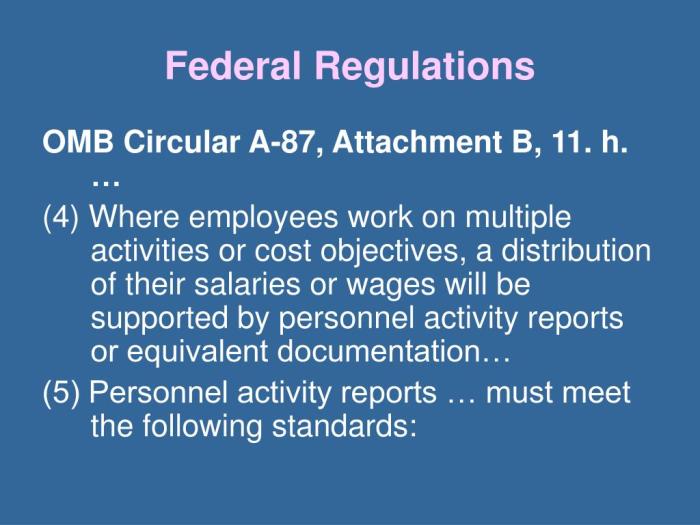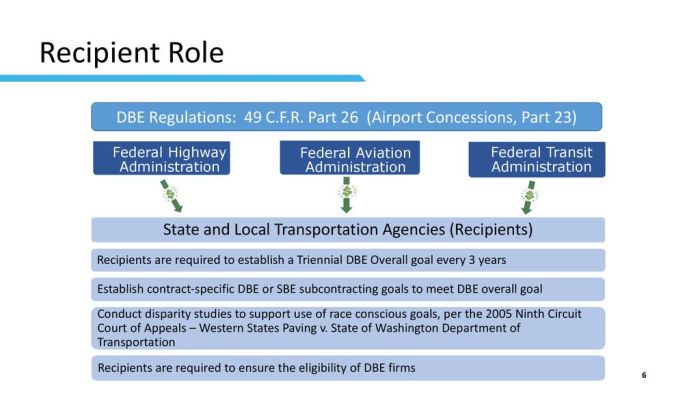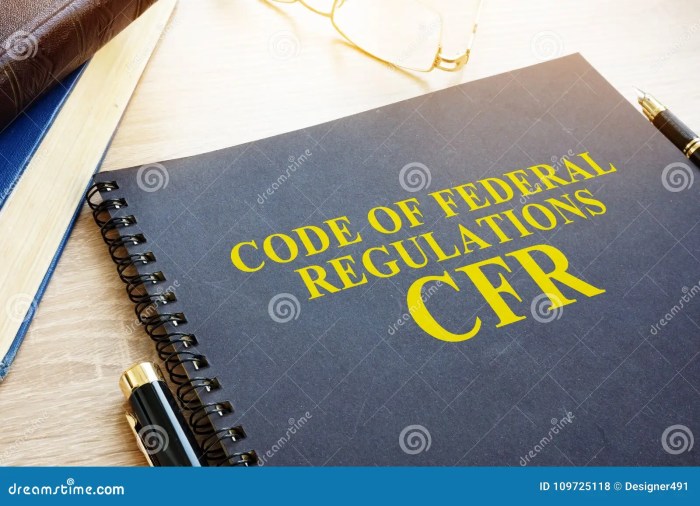The federal regulations – sbe sets the stage for this enthralling narrative, offering readers a glimpse into a story that is rich in detail and brimming with originality from the outset. This comprehensive guide delves into the intricate web of federal regulations that impact Small Business Enterprises (SBEs), providing a clear understanding of their scope, impact, and implications.
As we delve deeper into the topic, we will explore the rationale behind these regulations, examining their intended objectives and potential consequences. We will also analyze the specific ways in which these regulations affect SBE operations, highlighting both the benefits and challenges they present.
Federal Regulations and SBE

Federal regulations play a crucial role in shaping the operating environment for Small Business Enterprises (SBEs). These regulations aim to ensure fair competition, protect consumers, and promote economic growth. Understanding the scope and rationale behind these regulations is essential for SBEs to navigate the regulatory landscape effectively.
Key Federal Regulations Impacting SBEs
Federal regulations impact SBEs in various ways. Some key regulations include:
- Small Business Act (SBA): Establishes the Small Business Administration (SBA) and provides support programs for SBEs, such as loans, grants, and counseling.
- Equal Employment Opportunity Act (EEOA): Prohibits discrimination in employment based on race, color, religion, sex, national origin, age, or disability.
- Occupational Safety and Health Act (OSHA): Sets standards for workplace safety and health to protect employees from hazards.
- Environmental Protection Agency (EPA) Regulations: Protect the environment and human health from pollution and other hazards.
- Food and Drug Administration (FDA) Regulations: Ensure the safety and quality of food, drugs, cosmetics, and medical devices.
Rationale and Objectives of Federal Regulations
Federal regulations are designed to achieve several objectives:
- Protect Consumers: Ensure the safety and quality of products and services.
- Promote Fair Competition: Prevent monopolies and anti-competitive practices.
- Support Small Businesses: Provide assistance and resources to help SBEs grow and compete.
- Protect the Environment: Minimize pollution and preserve natural resources.
- Enhance Public Health and Safety: Ensure workplaces are safe and healthy, and protect the public from hazards.
Impact on SBE Operations

Federal regulations significantly influence the operations of Small Business Enterprises (SBEs). These regulations aim to ensure fair competition, protect consumers, and promote economic stability. Understanding their impact is crucial for SBEs to navigate the business landscape effectively.
The impact of federal regulations on SBEs can be both beneficial and challenging. Let’s explore the specific ways in which these regulations affect SBE operations:
Compliance Requirements
Federal regulations impose compliance requirements on SBEs, including adhering to labor laws, environmental regulations, and financial reporting standards. Compliance can be time-consuming and costly, particularly for small businesses with limited resources.
Market Access and Competition
Federal regulations can impact market access and competition for SBEs. Regulations such as industry-specific licensing and certification requirements can create barriers to entry for new businesses and limit competition.
Consumer Protection and Safety
Federal regulations prioritize consumer protection and safety. SBEs must comply with regulations related to product safety, labeling, and advertising to ensure the well-being of consumers.
Taxation and Financial Management
Federal regulations govern taxation and financial management for SBEs. SBEs must comply with tax laws and regulations, which can affect their profitability and financial planning.
Real-Life Case Study
For instance, the Dodd-Frank Wall Street Reform and Consumer Protection Act of 2010 imposed stringent regulations on financial institutions, including small banks. This led to increased compliance costs and reduced access to capital for small businesses.
Compliance and Enforcement: The Federal Regulations – Sbe

Federal regulations impose specific compliance requirements and procedures on SBEs. Adherence to these regulations is crucial to ensure the integrity and fairness of government contracting. Failure to comply can result in severe consequences.
Compliance Requirements
SBEs must adhere to various compliance requirements, including:
- Maintaining accurate and up-to-date business records.
- Submitting timely and complete reports.
- Complying with ethical standards and conflict-of-interest regulations.
- Ensuring equal opportunity in employment and business practices.
- Meeting performance standards as Artikeld in contracts.
Consequences of Non-Compliance
Non-compliance with federal regulations can have significant consequences for SBEs. These may include:
- Termination of contracts.
- Suspension or debarment from future government contracting.
- Financial penalties.
- Damage to reputation.
Role of Regulatory Agencies
Regulatory agencies play a vital role in enforcing compliance with federal regulations. They conduct audits, investigate complaints, and take appropriate action against non-compliant SBEs. These agencies include the Small Business Administration (SBA), the Office of Federal Contract Compliance Programs (OFCCP), and the General Services Administration (GSA).
The federal regulations – SBE, in a nutshell, are all about ensuring a level playing field for all participants in the financial markets. While there are debates about the pros and cons of elite democracy, where power is concentrated in the hands of a select few, the federal regulations – SBE serve as a reminder that even in a system where the wealthy and powerful hold sway, there are still measures in place to protect the interests of the average citizen.
For more on elite democracy, check out elite democracy pros and cons . Ultimately, the federal regulations – SBE are a testament to the ongoing struggle to balance the interests of the few with the needs of the many.
Advocacy and Representation

Federal regulations significantly impact small businesses (SBEs), and it’s crucial for them to have access to advocacy and support to navigate these regulations effectively.
Various organizations and initiatives play vital roles in providing advocacy and support for SBEs. Industry associations, government programs, and other non-profit organizations offer resources, guidance, and representation to help SBEs understand and comply with federal regulations.
Industry Associations
Industry associations represent the interests of specific industries or sectors. They actively engage in the regulatory process by providing input on proposed regulations, advocating for changes that benefit their members, and educating SBEs about regulatory requirements.
- The National Small Business Association (NSBA) advocates for small businesses on a national level, providing resources and representation in regulatory matters.
- The Small Business Technology Council (SBTC) represents the interests of small technology businesses, offering guidance on regulations related to technology and innovation.
Government Programs
Government programs also provide support to SBEs regarding federal regulations. The Small Business Administration (SBA) offers a variety of resources, including:
- The Office of Advocacy, which represents the interests of small businesses within the federal government and provides guidance on regulations.
- The Small Business Regulatory Fairness Act (SBREFA), which requires federal agencies to consider the impact of regulations on small businesses and seek their input.
Opportunities for SBE Participation
SBEs have opportunities to participate in the regulatory process and influence regulations that affect them. They can:
- Comment on proposed regulations during public comment periods.
- Attend public hearings and provide testimony on regulations.
- Join advisory committees or working groups that provide input to federal agencies on regulations.
Best Practices for Compliance
Maintaining compliance with federal regulations is crucial for SBEs to avoid penalties and reputational damage. Here are some best practices to ensure adherence:
- Establish a Compliance Program:Develop a comprehensive program that Artikels policies, procedures, and responsibilities for compliance.
- Train Employees:Regularly train employees on relevant regulations and their roles in compliance.
- Monitor Compliance:Regularly review operations and conduct internal audits to identify potential compliance issues.
- Maintain Documentation:Keep accurate records of all compliance-related activities, including training, audits, and corrective actions.
- Seek External Assistance:Consider seeking guidance from legal counsel or compliance consultants to ensure compliance with complex regulations.
- Foster a Culture of Compliance:Promote a workplace culture that values compliance and encourages employees to report any concerns.
- Stay Informed:Regularly monitor regulatory updates and changes to ensure ongoing compliance.
Actionable Checklist for Compliance
- Establish a compliance program.
- Train employees on relevant regulations.
- Monitor compliance regularly.
- Maintain documentation of compliance-related activities.
- Seek external assistance when needed.
- Foster a culture of compliance.
- Stay informed about regulatory updates.
Case Study: Successful Compliance Strategy, The federal regulations – sbe
ABC SBE implemented a comprehensive compliance program that included:
- Establishing clear compliance policies and procedures.
- Training employees on all applicable regulations.
- Regularly conducting internal audits to identify and address compliance risks.
- Maintaining detailed documentation of compliance activities.
- Fostering a culture of compliance and encouraging employees to report any concerns.
As a result of their proactive compliance strategy, ABC SBE has avoided any regulatory violations and has maintained a positive reputation in the industry.
FAQs
What are the key federal regulations that impact SBEs?
Some of the key federal regulations that impact SBEs include the Fair Labor Standards Act, the Occupational Safety and Health Act, the Americans with Disabilities Act, and the Environmental Protection Act.
How can SBEs ensure compliance with federal regulations?
SBEs can ensure compliance with federal regulations by staying informed about the latest regulations, implementing effective compliance programs, and seeking professional guidance when necessary.
What are the potential consequences of non-compliance with federal regulations?
Non-compliance with federal regulations can result in fines, penalties, and even criminal charges.